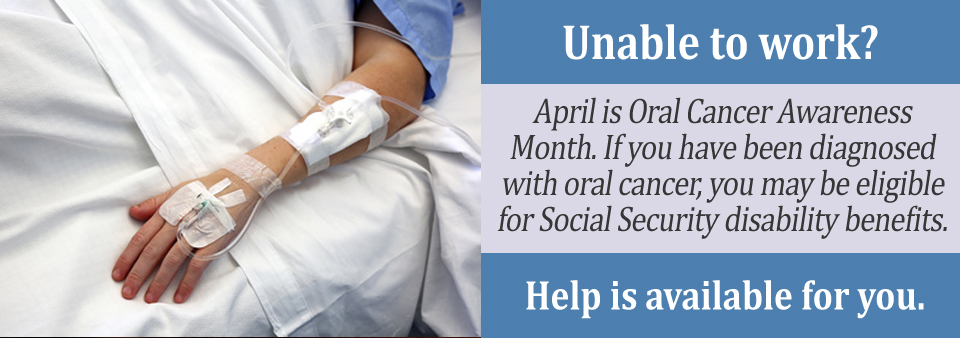Over 50,000 Americans are diagnosed with oral cancer each year. Oral cancer is a type of head and neck cancer that occurs in the mouth, sinuses, or throat. While anyone can develop oral cancer, the risk is much higher for those who use tobacco or drink excessive alcohol.
It can be challenging coping with an oral cancer diagnosis. Treatment can result in difficulty breathing, swallowing, eating, and speaking. As a result, oral cancer can have a significant impact on one’s ability to continue working. The Social Security Administration (SSA) has developed disability programs aimed at offering financial assistance to individuals who are unable to work due to a health condition, such as oral cancer.
Why an Awareness Month for Oral Cancer?
April is Oral cancer awareness month. Oral cancers are not any more difficult to diagnose or treat than other cancers, but they are often discovered late in its development, making it one of the deadlier diseases. However, routine oral screening by a dentist can help to detect oral cancer early.
The earliest signs of oral cancer are often mistaken for other health problems, such as a canker sore, a toothache, or even a cold. Therefore, it’s vital to address oral concerns quickly. The earlier that oral cancer is detected, the higher the odds of recovery.

How Can Someone with Oral Cancer Qualify for Social Security Disability Benefits?
If you have been diagnosed with oral cancer and are too ill to work as a result, you may qualify for Social Security Disability Insurance (SSDI) benefits. Perhaps the easiest way to earn disability benefits is to meet a Blue Book listing. The Blue Book is a medical guide used by the SSA to determine what conditions qualify for disability and how those conditions meet the specific qualifications listed in the book.
Oral cancers are addressed in Blue Book section 13.00, Malignant Neoplastic Diseases. Section 13.08, cancer of the salivary glands, is the only section of the Blue Book to address oral cancers directly. However, some cancers of the mouth would meet a listing in section 13.02, which discusses soft tissue cancer of the head and neck. Individuals with oral cancer might also meet listing 13.04, soft tissue sarcoma. As a general rule, your cancer will need to be advanced and have spread beyond the regional lymph nodes to be considered for disability benefits.
What If I Don’t Meet or Match a Blue Book Listing for My Oral Cancer?
Not all individuals with oral cancer will meet a Blue Book listing for their impairment. If you do not meet the criteria as listed in the Blue Book, it is possible to still earn a disability award through a medical-vocational allowance.
Once it becomes clear that an individual does meet a Blue Book listing, the medical record will be reviewed by an examiner to determine what kinds of functional limitations the individual has. After a thorough review of your medical history, the SSA will evaluate your residual functional capacity (RFC). Your RFC classification will determine the most that you are able to perform when it comes to work activities.
Individuals with oral cancer may have difficulty speaking or standing for long periods of time, which could make certain jobs very difficult to perform. Your age, work history, and the severity of your oral cancer will all come into consideration when determining whether or not you can continue working or adjust to another level of work. Individuals who are older, less educated, and have less specialized skills are more likely to be approved under a medical-vocational allowance.
How Do I Start the Disability Application Process for Oral Cancer?
Oral cancer is relatively rare compared to other cancers, and yet it is just as devastating. If you have been diagnosed with oral cancer and you are unable to work as a result, you may qualify for Disability benefits from the SSA.
The SSDI application process is complicated. As a result, you may want to consider contacting a Disability attorney or advocate to discuss your case in further detail. An experienced Social Security lawyer can help you determine if you have sufficient medical evidence to potentially win your disability case or oral cancer. Further, he or she can assist you with the application and potential appeals process.